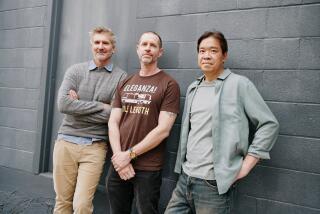Can Tao Lin see the future?
Tao Linâs new novel, âTaipei,â is more obviously autobiographical than previous efforts â about a young, male, Asian American New York urbanite and social-media compulsive paralyzed by a robot-ennui style of depression.
Lin has energetically cultivated a reputation as a shameless self-promoter and boutique literary writer whom hipsters and Internet art-lit culturists call âcontroversialâ and love to hate; comparisons to Bret Easton Ellis abound, and rightly, since Lin writes in part about a privileged, dissipated youth drug subculture and aims for an amoral, affectless voice designed to shock. Lin works hard on his fame project and poses frequently for virtual snapshots, claiming, for instance, to be âlike a robotâ and not to have any âopinions about society.â
A genuinely original stylist, Lin writes in a deadpan, automated voice that characterizes with powerful flatness his antiheroâs ongoing crisis of narcissism/social anxiety disorder. When it hits, his prose can be very funny â particularly before its abject bleakness sinks in, when the faint possibility of warmth and significance hovers over the pages like a hopelessly outmoded, naively romantic dream.
Despite the novelâs sporadic wit, to read âTaipeiâ all the way to the end is an exercise in self-flagellating cruelty, largely because of Linâs rock-solid commitment to monotony. Reading this text is not unlike staring fixedly at a blank wall.
Whether you wish to participate in the reading/wall-staring exercise â and whether it produces value for you â may simply depend on your appetite for either (a) personality disorders or (b) tedium. (If TV shows are anything to go by, the marketâs bullish on at least those two.) Or it may depend on your sense of humor: If the comedy of the bookâs repeated, uninflected assertions doesnât fade for you as you turn its pages, thereâs really no reason to put it down.
The âplotâ of âTaipei,â which is far more readable than, for example, Linâs silly earlier novel âRichard Yatesâ (in which, as a PR stunt and moneymaker, he sold shares) proceeds roughly thus: A twentysomething protagonist, superficially and postmodernly indistinguishable from the author, leads an idle life of passive urban blankness, with regular forays out to parties and restaurants to search for potential girlfriends (and/or platonic male companions). Between self-conscious sorties, he participates in obsessive, vacuous social media gestures, producing and consuming status updates, tweets, etc.
At a certain point, when he is between girlfriends, this do-nothing lassitude is exchanged for a drug-taking lassitude, which carries with it an increase in energy and productivity. Now things begin to happen a bit faster: a book tour, a new girlfriend impulsively married in Vegas, followed by a marital trip to Taiwan for a book event/parental visit and finally, a 100% unsurprising marital decline.
For a time, the impulse marriage generates a togetherness thatâs slightly less empty than the previous aloneness, though admittedly most of that togetherness consists of taking (âingestingâ) drugs, then making student film-y videos in McDonaldâs. At the end (spoiler alert), thereâs a glancing intimation of something vaguely, generically positive.
Linâs charactersâ actions and observations are described with a clinical neutrality thatâs at first intriguing (is something exciting, even metaphysical, being invoked?), then dull (nah ⌠nope) and finally, death-march grim (are we there yet?), as the emotionless void at the core of the book assents in the notion that humans â or at least first-world humans of a certain bourgeois demographic â have actually, trickily already evolved into binary shells of humans.
Linâs people might be called, say, âautomaton humanoidsâ who are, as he notes, on their way to a transitional cyborg form, thereafter to become fully machine.
This conversion to android has apparently occurred more rapidly and seamlessly than many of us expected â sometime between, say, Pac-Man and present day â and in Linâs world, at least, is far less a science fiction conceit than a factual description of the Facebook generationâs droid-void personality.
Of course, Lin is hardly the first novelist to flamboyantly raise a middle finger at lit-ra-choor â a punk gesture pulled off most successfully by male scenester writers making a deliberate choice to be poseurs. But Lin is coy, often demurely denying that heâs flipping anyone the bird. After all, heâs no Sid Vicious; heâs far too listless to be rude. His technique is more emo than punk, more laptop than desktop, more consumerist apathy than anarchist fire. If Ellisâ notorious American psycho was a successful philanderer and serial killer, Linâs protagonist is more like a eunuch trying to commit a rape.
The worst thing about âTaipei,â and also the best, is that every humdrum utterance of the narrative voice, every static, content-free description of a banal action or egocentric observation has authenticity.
You cross your fingers, as a reader, and make a wish: that this author does not in fact have his âfinger on the pulse of a generation,â as the hackneyed phrase goes. You hope itâs only the authorâs crypto-autistic choices that render this universe so painfully real, not the resonance from a spot-on depiction of a soulless culture. Because if weâre already machines, youâre thinking, please let us be more interesting machines than this. Linâs achievement is less robot than mannequin, polymer on the outside and air within.
Of course, that you find yourself thinking along those lines at all is a testament to the pitch-perfect quality of Linâs ultra-self-involved, defiantly and egregiously boring story.
Milletâs novel âMagnificenceâ is the last in a trilogy about loss and extinction.
Taipei
Tao Lin
Vintage: 256 pp., $14.95 paper
More to Read
Sign up for our Book Club newsletter
Get the latest news, events and more from the Los Angeles Times Book Club, and help us get L.A. reading and talking.
You may occasionally receive promotional content from the Los Angeles Times.







